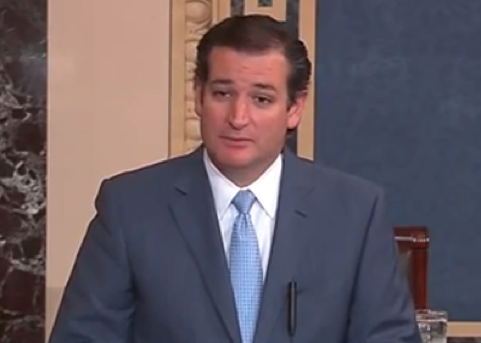The federal government shutdown is entering a second week with House Speaker John Boehner refusing to hold a vote on a “clean continuing resolution” that would reopen the government without delaying or defunding Obamacare. One of the key players in this standoff is Texas Sen. Ted Cruz, who has been doing his best to make the defunding of Obamacare at any cost a litmus test for fellow Republicans (meaning that they should be ready for a well-financed Republican primary challenger from the Tea Party if they go against Cruz).
The Washington Examiner’s Byron York relayed the comments of a GOP House member who refused to be identified but said “the Cruz phenomenon” caught Republican congressional leaders off-guard. He (I’m guessing this is the right pronoun) offered a military metaphor:
“I would liken this a little bit to Gettysburg, where a Confederate unit went looking for shoes and stumbled into Union cavalry, and all of a sudden found itself embroiled in battle on a battlefield it didn’t intend to be on, and everybody just kept feeding troops into it,” the congressman said. “That’s basically what's happening now in a political sense. This isn’t exactly the fight I think Republicans wanted to have, certainly that the leadership wanted to have, but it’s the fight that’s here.”
Last week, a Cruz acolyte in the House proclaimed, “We’re not going to be disrespected” by the Obama administration, but respect for Boehner’s leadership seems to be optional among his caucus members.
But is Cruz honoring—if perhaps taking it to a new level—the American political tradition of pushing away protocol? Commonweal’s Robert Geroux puts the Cruz crusade in the context of an “end of deference” in American politics:
In his book on American exceptionalism, Seymour Martin Lipset listed a resistance to defer to authority as one principle that characterizes the ideology of “Americanism,” next to the pursuit of liberty, egalitarianism, individualism, populism, and a laissez-faire attitude. So self-assertion may be part of our cultural DNA. […]
Cruz is […] not such an outlier. His actions and words remind us that we are counseled everywhere and at every turn in popular culture to be aggressive, that only winners matter, and that every compromise is a loss. His “fast track” acknowledges no principled deference to the more moderate “squishes” in his own party.
I think there’s something to this, but political aggression is not considered OK for everyone. It’s celebrated as a small-town virtue, distinct from the “community organizing” in urban areas (which often challenges political machines) that Sarah Palin and Rudy Guiliani sneered at in 2008.
Who are the equivalents to Cruz in the Democratic Party? Cruz is the junior senator from a large state that voted against the incumbent president by 16 points. Eight years ago, Hillary Clinton was the junior senator from a large state (heavily urban New York) that voted against the incumbent president (George W. Bush) by 18 points. But she was hardly someone who believed that “every compromise is a loss,” and she deferred to the Bush administration by supporting its policy to invade Iraq.
As for Obama, he has always been a “squishy” Democrat, adopting a Republican governor’s market-based policy for expanding health insurance coverage instead of fighting for the single-payer system that most Democratic activists wanted. Obama has always been aware that if he used hardball tactics (such as threatening to run primary challengers against Democrats who don’t vote his way) they would be condemned as thuggish politics, and not as Cruz-style individualism. In 2008, conservative writer Michael Barone actually undercut Palin’s attempt to paint Obama as a radical by saying he had been, essentially, too deferential to power. (“As a state senator and then as a U.S. senator, Obama took care not to antagonize the Chicago civic establishment.”)
Bluster and self-regard seem to work for Texans, but consider a “bizarro world” situation. According to Roll Call, the current government shutdown would end if Boehner allowed a vote on a clean continuing resolution and 17 Republican members joined the 200-member Democratic caucus to pass it. Imagine if the 41-member Congressional Black Caucus refused to go along with such a deal unless it included a revised Voting Rights Act that would pass muster with the U.S. Supreme Court. Or if the CBC made full congressional representation for the District of Columbia, something that’s been shamefully denied for centuries, a condition of raising the national debt. Would the Democratic Party give a respected elder statesman like U.S. Rep. John Lewis of Atlanta the power and, yes, the deference that the Republican Party gives Ted Cruz? History does not suggest an affirmative answer.
Photo from official website for U.S. Sen. Ted Cruz.
Related: "Religious Leaders Decry Federal Shutdown."








